Episodes

Sunday Apr 16, 2023
Sunday Apr 16, 2023
Vaping, or electronic cigarette use, is becoming increasingly popular, especially among youth and young adults. While it is perceived as safer than tobacco cigarettes, the exact composition of the liquids used in e-cigarettes is not publicly known, making it difficult to predict the health effects. E-cigarette contents include nicotine, flavors, chemical additives, and a solvent. Studies have shown that vaping can have negative effects on cardiovascular health, such as higher arterial stiffness, impaired endothelial function, and increased blood pressure. However, clinical studies were inconclusive, and long-term trials were not available. It is also unclear if e-cigarettes can be effectively used for smoking cessation. We reviewed the contents of the vape, the latest literature, and the statement from the American heart association on electronic cigarettes, and here are the facts.
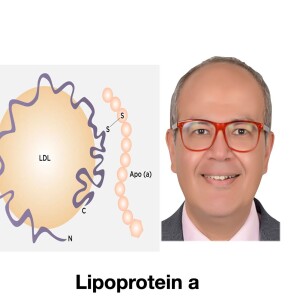
Monday Jan 02, 2023
Monday Jan 02, 2023
Lipoprotein a is a molecule produced by the liver, similar to LDL in structure, with a peculiar protein that gives it wide variability.Elevated lipoprotein little (a) is causal of atherosclerotic disease, recurrent strokes, and aortic calcification. Smaller forms of LPa are riskier. LPa is not a risk factor for venous thromboembolismThe levels are determined genetically with minimal impact from lifestyle.Normal values are 125 nmol/L)Levels should not be converted from mg to mmol or vice versaLevels should be measured once in the lifetimeThe excess risk of LPa elevation can be mitigated by additional LDL lowering and tighter CV risk factor control.PCSK9i(s) reduces the levels by 25%, but they are not approved for this indication.Aspirin may be beneficial as primary prevention in individuals with genetic variants that elevate LPa.Specific therapies are being developed to lower LPA by >70% and may be released three years from now.

Sunday Aug 14, 2022
Sunday Aug 14, 2022
Sleep is the single most effective way to reset our brain and body health each day. Sleep is a foundational element of human biology and is a requirement for life. We spend roughly one-third of our lives asleep. A famous quote is, “Happiness is nothing more than getting enough sleep”. Sleep disturbance is a common condition in modern society, with evidence showing that people sleep on average 1.5 hr less than a century ago. one-third of the general population suffers from sleep-related problemsAnd now, we better understand the relationship between poor sleep and poor health, especially cardiovascular health. Just a couple of months ago, the American heart association added Sleep to the essential pillars of cardiovascular health.And in this episode, we will discuss sleep and heart health, what is good sleep, what is bad sleep, what’s the risk of poor sleep, and we will end up with some advice on how to improve your sleep for a stronger heart. First, is there a relationship between the number of hours slept and CV health?Yes, we have clear data on this relationshipSleeping for less than six hours is associated with a 70% increase in mortality Sleeping 5 hr or less per night had a 2.3-fold greater risk of AMISleeping for less than four hours is associated with a 2.8 times increase in mortality Sleeping for nine hours or more was also associated with a 70% increase in mortality The ideal duration of sleep is between seven hours and eight hours because this has been associated with the best survival.During normal, healthy sleep, blood pressure drops by around 10-20%. This is known as nocturnal dipping, and research highlights its role in cardiovascular health. When we sleep, the blood pressure comes down, and the heart rate also goes down. This helps to unload the circulatory system and give rest to the heart. Poor sleep, whether from a lack of sleep or sleep disruptions, is associated with non-dipping, meaning that a person’s blood pressure doesn’t go down at night. Studies have found that elevated nighttime blood pressure is related to overall hypertension (high blood pressure). Not only hypertension but sleep disruption is also associated with an increased risk of diabetes, coronary atherosclerosis, and myocardial infarction. Add to that obesity risk; we can remember that we are more likely to feel hungry when we don’t get enough sleep. All these conditions are increased with sleeping less than six hours or with sleeping more than nine hours. It is a U-shaped relation.We've understood the impact of sleep quantity on health, but what is the impact of poor sleep quality on health?We also know that difficulty falling asleep, nightmares, easily awakening from sleep, use of sleeping pills, and walking up tired are markers of poor sleep.Poor sleep quality was associated with subclinical cardiovascular disease and increased risk of cardiovascular disease. Sleep apnea, where there is airway obstruction resulting in loud snoring and apnea, is a well-established risk for resistant hypertension, heart failure, coronary disease, and atrial fibrillation.What’s the mechanism linking sleep and poor cardiometabolic health?There are several potential mechanisms. Data show that a lack of sleep may increase sympathetic nervous system activity the next day; sleep deprivation also results in an inflammatory state and in increased salt intake, elevated cortisol levels, and insulin resistance. These changes all culminate in poor cardiometabolic health resulting in a cascade or a package of cardiovascular diseases. How to improve your sleep?First: Identify your ideal sleep durationThe general rule is 7-8 hours of daily sleep. But because this may vary, you can measure your own needed sleep hours this way… Try to get into bed at the time where you fall asleep within about 15 minutes, and wake up without an alarm clock, feeling rested, and having enough energy to carry you through the day. On average, the amount of sleep you get this way is probably the right amount of sleep for you. The American heart association elected to add sleep duration as an eighth metric to the formal definition of CVH. Metric: Average hours of sleep per night Scoring: Points Level 100 7–
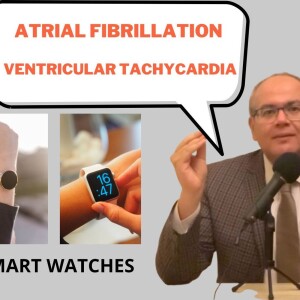
Sunday Jul 24, 2022
Sunday Jul 24, 2022
How can wearables and smartwatches guide the diagnosis and management of serious arrhythmias like atrial fibrillation and ventricular tachycardia?
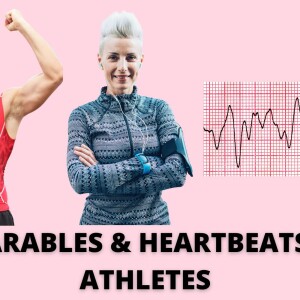
Sunday Jul 24, 2022
Sunday Jul 24, 2022
Athletes also can have heart disease and can collapse in the field.How can wearable digital devices help an athlete who has suspected arrhythmia?
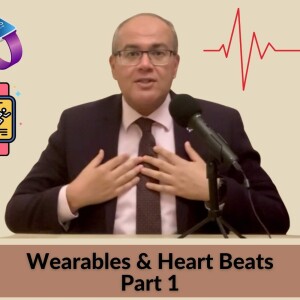
Saturday Jun 18, 2022
Saturday Jun 18, 2022
Smart gadgets are all around, in TVs, phones, cameras, cars, kitchens, and also on our skin! Bands, watches, rings, earbuds, and even shirts can monitor our bodies and give insights into our health and disease.The global Wearable Technology Market size was worth about 115.8 (USD billion) in 2021 and is predicted to grow to around 380.5 (USD billion) by 2028Wearables can measure the pulse and can even tell the heart rhythm. How can wearable technology’s ability to monitor rate and rhythm help in medicine? How accurate are they? Can physicians rely on them in the diagnosis and treatment of abnormal heart rhythms (arrhythmia)? The European heart rhythm association (EHRA) has recently released a practical guide on the use of digital devices to detect and manage arrhythmia and we are here to review it.I will not discuss medical devices such as Holter monitors or implantable devices that can deliver therapy such as pacemakers and life vests as they are well established, are prescribed and used by a physician, and fall outside the scope of this episode. We will give an overview of Devices that anyone can buy and use outside the hospitals; types and advantages of eachClinical application to evaluate palpitation
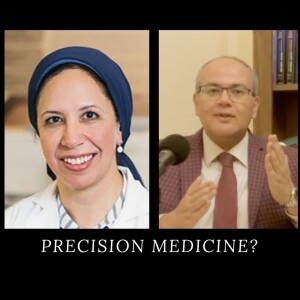
Saturday Jun 04, 2022
Saturday Jun 04, 2022
How to tailor medicine for each and every individual person? Mixing clinical variables, genetic variants, and molecular profiles, all into Artificial Intelligence can lead to "Precision Medicine"...Interviewing Prof Maha Saber-Ayad, Professor of Pharmacology at Sharjah University on Pharmacogenomics and the quest for precision medicine.

Monday May 23, 2022
Monday May 23, 2022
Paris is not only the city of light, love, and culture but it is also the home of the biggest interventional cardiology meeting Paris Course on Revascularization PCR. Last week, the meeting was back in person after two years of COVID-imposed virtual attendance. Eight thousand attendees inside the “Palais de Congress”, tens of sessions, live cases, and industry stands. This version of Euro PCR celebrated 30 years of radial cath and 20 years of transcatheter aortic valve interventions (TAVI). I had the chance to attend, meet the experts, and present my cases. And I am here bringing to the cardio buzz audience, who couldn’t make it to the conference, the hot topics, and the latest breaking trials from Paris.7. Robots invade the cath lab6 Simulate before you operate5 Leaving nothing behind4 Fewer wires in, more data out3 How long will the valve live?2 Snuff boxers punched in the DISCO1 A Patch to Stop Bleeding
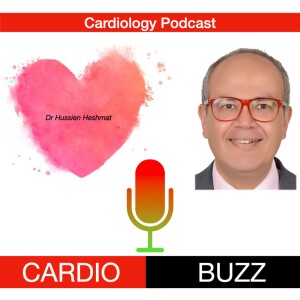
Sunday May 15, 2022
Sunday May 15, 2022
Drawing a map of genes might help us predict who will get sick and when we will get sick of heart disease or cancer. And we have seen Angelina Jolie, the famous actress, going for a preventive mastectomy because she had a faulty gene for breast cancer. But Is it the inevitable destiny, or can we change it? Do genes decide who will have heart disease? Who is to be blamed for heart disease? The genes we inherit, or the environment where we grow and live?Can your good genes protect you from your unhealthy lifestyle? Can a good lifestyle buffer our faulty genes?Watch it 🎦 on YouTube Read 📖it on LinkedIn ReferencesCirculation. 2022;145:808–818. DOI: 10.1161/CIRCULATIONAHA.121.053730https://www.ahajournals.org/doi/10.1161/CIRCULATIONAHA.121.053730
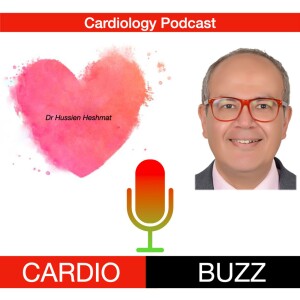
Saturday May 07, 2022
Saturday May 07, 2022
With all its health benefits, cheap, and with few side effects, Aspirin is in every house. Aspirin reduces mortality in acute myocardial infarction. It is intuitive to use it for prevention, not only for treatment. Some studies supported that practice.But in the 21st century, we realize that aspirin is a gastric irritant and can cause bleeding. We got better pain killers and more potent platelet inhibitors, and we started questioning aspirin's protective effect compared to other drugs. So what’s the truth about Aspirin? Should people above 40 with no heart or vascular disease take Aspirin to prevent heart attacks and strokes or not? LinkedIn articleYouTube VideoAspirin Use to Prevent Cardiovascular Disease: US Preventive Services Task Force Recommendation Statement.” JAMA 327, no. 16 (April 26, 2022): 1577–84. https://doi.org/10.1001/jama.2022.4983https://www.cvriskcalculator.comhttps://www.uspreventiveservicestaskforce.org/uspstf/recommendation-topics









